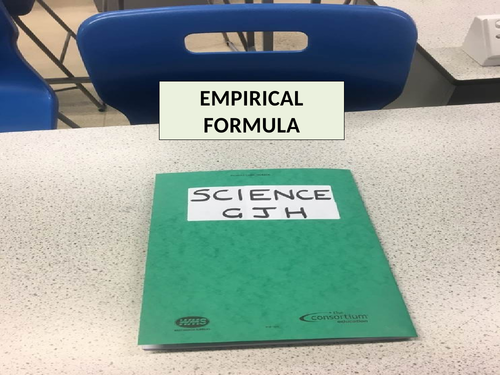



A fully-resourced lesson which guides students through the method involved in calculating the empirical formula and includes a concise, clear lesson presentation (21 slides) and practice questions. Students are given a template to use as they are introduced to the questions and then encouraged to work without it as the lesson progresses. The students are shown how empirical formula questions can be made more difficult and hints are given so that students are able to tackle them and access all of the marks available.
This lesson has been designed for GCSE students (14 - 16 year olds in the UK)
Get this resource as part of a bundle and save up to 44%
A bundle is a package of resources grouped together to teach a particular topic, or a series of lessons, in one place.
Topic C1e: Chemical formulae, equations and calculations (Edexcel iGCSE Chemistry)
This bundle of 10 lessons covers the majority of the content in Topic C1e (Chemical formulae, equations and calculations) of the Edexcel iGCSE Chemistry specification. The topics and specification points covered within these lessons include: * Writing word equations * Writing balanced symbol equations (with state symbols) * Calculate relative formula masses * Know that the mole is the unit for the amount of a substance * Understand how to carry out calculations involving amount, relative atomic and formula mass * Calculate reacting masses * Calculate percentage yield * Know the terms empirical formula and molecular formula and be able to calculate both * Calculate concentration of solutions * Calculate gas volumes All of these lesson presentations and accompanying resources are detailed and engaging and contain regular progress checks to allow the students to constantly assess their understanding.
Topic C2: Elements, compounds and mixtures (OCR Gateway A GCSE Chemistry)
This bundle of 19 lessons covers the majority of the content in Topic C2 (Elements, compounds and mixtures) of the OCR Gateway A GCSE Chemistry specification. The topics covered within these lessons include: Relative formula mass Empirical formula Pure and impure substances Filtration and crystallisation Distillation Chromatography Metals and non metals Electronic structure Forming ions Ionic compounds Simple molecules Giant covalent structures Polymer molecules Metallic bonding Allotropes of carbon Graphene and the fullerenes Changing state Nanoparticles All of these lesson presentations and accompanying resources are detailed and engaging and contain regular progress checks to allow the students to constantly assess their understanding.
Topic C2: Elements, compounds and mixtures (OCR Gateway A GCSE Combined Science)
This bundle of 18 lessons covers the majority of the content in Topic C2 (Elements, compounds and mixtures) of the OCR Gateway A GCSE Combined Science specification. The topics covered within these lessons include: Elements Electron configurations Compounds Chemical formula of ionic compounds Ionic compounds Covalent substances Simple molecules Polymers Metallic bonding Diamond and graphite Graphene and the fullerenes Changing states Pure and impure substances Distillation Filtration and crystallisation Chromatography Interpreting chromatograms Relative formula masses Empirical formula All of these lesson presentations and accompanying resources are detailed and engaging and contain regular progress checks to allow the students to constantly assess their understanding.
Topic C2.1: Purity and separating mixtures (OCR Gateway A GCSE Combined Science)
This bundle of 10 lessons covers all of the content in the sub-topic C2.1 (Purity and separating mixtures) of the OCR Gateway A GCSE Combined Science specification. The topics covered within these lessons include: * Explain what is meant by the purity of a substance and use melting point to distinguish pure from impure * Calculate the relative formula mass separately and in a balanced symbol equation * Deduce the empirical formula of a compound * Explain that many useful materials are formulations of mixtures * Describe and explain the processes of filtration, crystallisation, simple distillation and fractional distillation * Describe the processes of paper and thin-layer chromatography * Recall that chromatography involves a mobile and stationary phase * Interpret chromatograms All of these lesson presentations and accompanying resources are detailed and engaging and contain regular progress checks to allow the students to constantly assess their understanding.
Calculations involving masses (Edexcel GCSE Combined Science & Chemistry)
This bundle of 7 lessons covers the majority of the content in the C1 sub-topic called CALCULATIONS INVOLVING MASSES of the Edexcel GCSE Combined Science & GCSE Chemistry specifications. The topics covered within these lessons include: Calculating relative formula mass Empirical formula The law of the conservation of mass Calculating masses in reactions Calculating concentration of solutions Avogadro's constant Mole calculations Limiting reactants Stoichiometry All of these lesson presentations and accompanying resources are detailed and engaging and contain regular progress checks to allow the students to constantly assess their understanding.
Something went wrong, please try again later.
This resource hasn't been reviewed yet
To ensure quality for our reviews, only customers who have purchased this resource can review it
Report this resourceto let us know if it violates our terms and conditions.
Our customer service team will review your report and will be in touch.